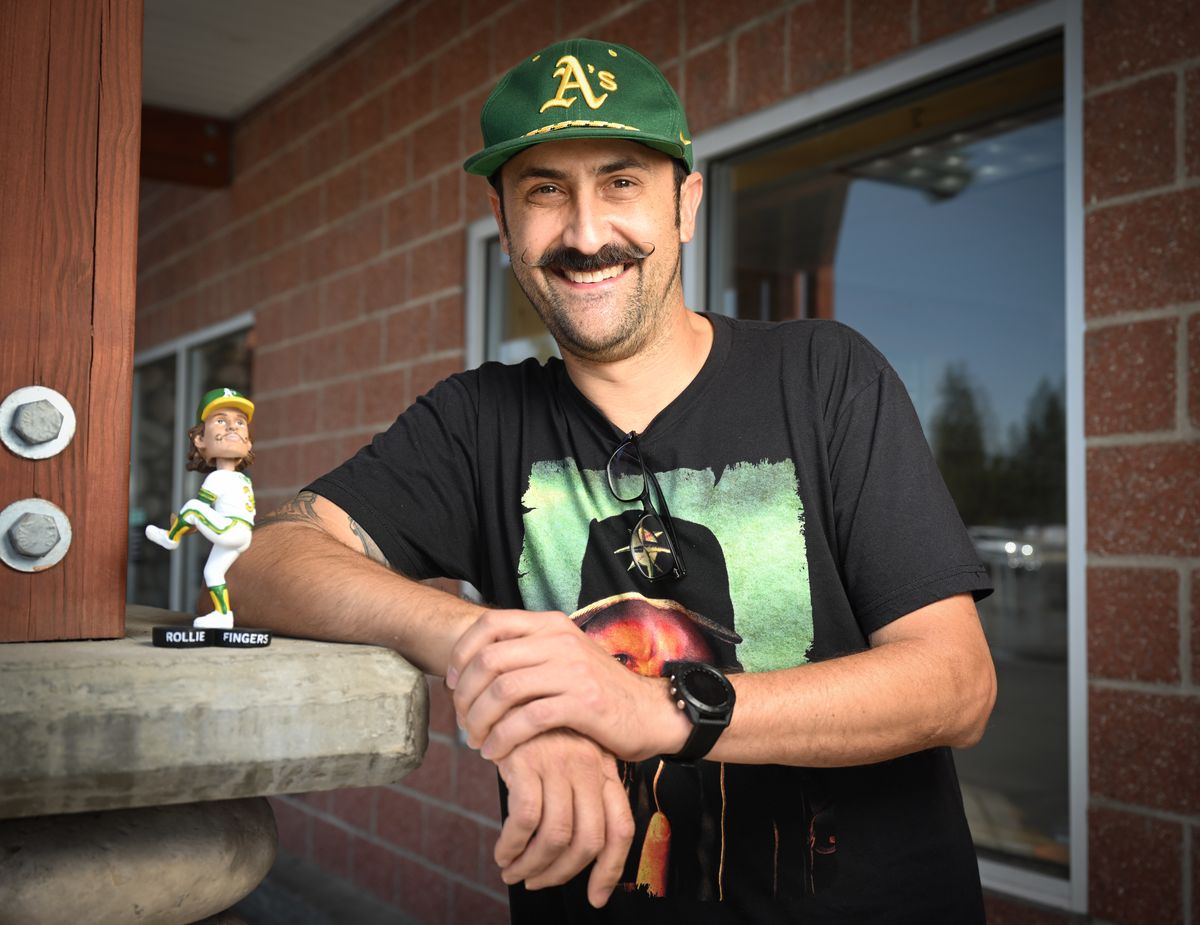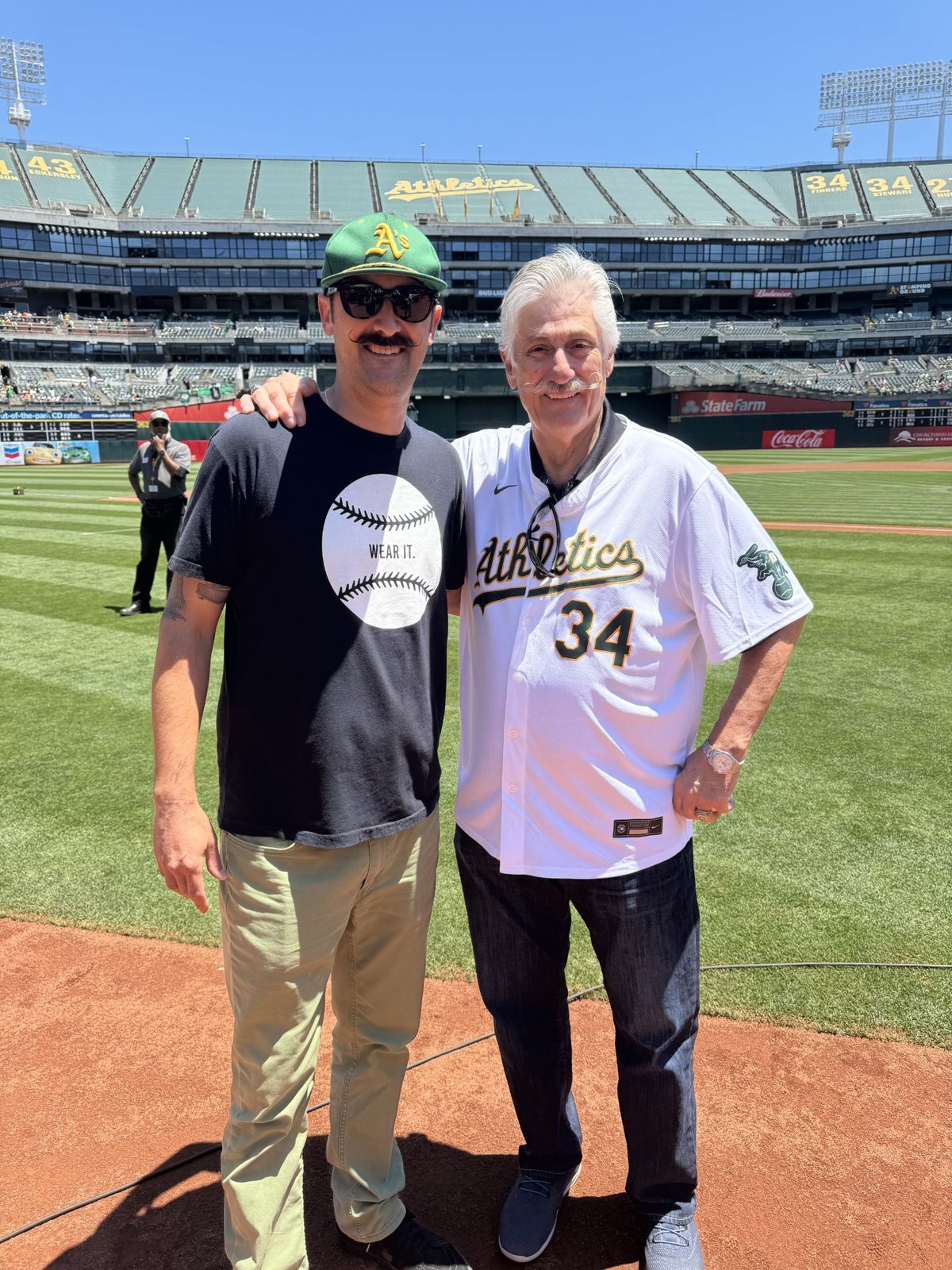Former Spokane Indians pitcher Jason Fingers reflects on his career and Hall of Fame dad Rollie Fingers
Jason Fingers, shown July 12 in Medical Lake, once played for the Spokane Indians, following in the footsteps of his famous father, MLB pitcher Rollie Fingers. (Jesse Tinsley/THE SPOKESMAN-REVI)
For baseball fans of a certain age, the name Rollie Fingers conjures a specific image of excellence and flair rarely matched in the game. The Hall of Fame closer – with his trademark handlebar mustache – redefined the role of relievers and helped the Oakland Athletics of the early ’70s win three consecutive World Series championships.
But to Jason Fingers, he was just “Dad.”
“If we’re just sitting at home watching baseball, just the regular stuff, it’s like, ‘Hey, it’s my dad,’ ” Jason Fingers said. “But then in that element where I see people double-taking on him, or coming up and asking him for autographs or stuff like that, that kind of reminds you he’s something else.”
Jason Fingers understood that his father was more than just a baseball player – the unique mustache helped Rollie Fingers become something of an icon in baseball throughout his playing career and into retirement. Jason admires his father for many things, not the least of which is his willingness to give fans his time.
“It’s always cool to see him light up someone’s life,” Jason said. “I know plenty of (athletes) that kind of just shun people and that’s one thing about my dad – he’s always willing to sign, always willing to talk baseball. He doesn’t ‘big league’ people, you know? He’s just really carried himself with class. And I’ve always respected that.”
At the beginning of July, Jason was able to accompany Rollie to a bobblehead day honoring the Hall of Famer at the Oakland-Alameda County Coliseum before an Oakland Athletics game.
“It was cool,” Jason said. “We got the full press box and red carpet treatment. … It’s just times like those when, you know, my dad is my dad, but when I go to Cooperstown or events like that, you kind of sit back and think ‘Wow.’ It kind of puts it more in perspective.”
Jason Fingers followed his father’s footsteps into baseball, but injuries cut short his athletic career. He was selected three times in the MLB draft – out of high school, junior college and Arizona State – eventually signing with the Kansas City Royals after being selected in the 10th round of the 2000 draft.
He played in 18 games with the short-season Spokane Indians that summer with a 1-2 record and 3.68 earned run average. He moved up to A ball the next season with Burlington (Iowa) and went 1-6 with four saves and a 3.71 ERA. But the normal soreness in his shoulder turned into something more serious, and like a lot of young pitchers, he tried to pitch through it.
The next spring training, with High-A Wilmington, the pain finally caught up to him.
“I had pitched through arm pain before, and I was like, ‘Maybe it will subside.’ But I got up there and threw a couple bullpens and didn’t record any innings. I just went to the manager, and I was like, ‘I don’t want to go out there and blow a game or something,’ knowing that I was hurt.”
In 2002 he had rotator cuff surgery in his right shoulder. He tried to come back the next season, with his fastball barely hitting 85 mph. He was feeling new and different pain in his shoulder, and the Royals released him after just two rehab appearances with their Arizona Complex League team.
Like many athletes, Jason found the end of his playing career tough to adjust to. Unlike most, he also had to come to terms with being a Hall of Famer’s kid.
“It was pretty difficult,” he said. “I mean, as far my dad being who he is and everything and wanting to follow in his footsteps. I knew I was never gonna have that legendary status. It’s kind of a high ceiling to reach for. But I mean, I just wanted to make my dad proud.”
Initially after his playing days were over, Fingers moved to Las Vegas. He worked as a caddie at golf courses and helped manage autograph and memorabilia sessions for another Oakland A’s Hall of Famer, Reggie Jackson.
A while after initially retiring, Fingers tried to make one more go at baseball, and his dad helped line up a tryout for Ned Yost, who was then the general manager with the Milwaukee Brewers.
“I went down (to Arizona) during spring training, and (Yost) took time out of his day to let me throw a bullpen,” he said. “And it wasn’t bad, but it just wasn’t electric. The next day, the pain was just horrible. And I called up and said ‘Hey, thanks for the opportunity. But I’m not gonna waste your time,’ and that was that and the rest is history.”
Wanting to get out of the desert, Jason Fingers moved back to the Inland Northwest. A buddy he knew from Vegas was working at the Coeur d’Alene Resort golf course and helped him get on there as a caddie.
“It was just a great environment with that whole thing,” he said. “I mean, it was awesome. I’d caddie, make a couple hundred bucks and then go on my buddy’s boat on the lake. You can’t beat that.”
He stayed in the region and made it his home.
These days, Jason works in the motor pool division of the state Department of Social and Health Services in Spokane, delivering commissary products to government buildings and agencies.
“I’ve lived everywhere – in Southern California, played in Arizona, traveled playing baseball, you know, I played in the Midwest League, spring training in Florida. And this is just the area that I love.”

